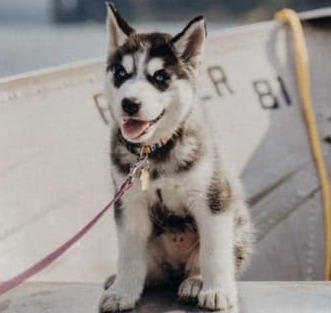This month I'm writing about specific training needs for each stage of your dog's life, starting with puppyhood. While potty training and basic manners are important to teach your puppy, alone time training and socialization are even more crucial.
Because puppies, like small children, don't understand object permanence, your puppy may not realize that even if you leave the room or the house you will return. To help puppies learn that things and people may go away but they will come back, trainer Julie Naismith suggests playing short games of peekaboo using toys, treats, and yourself. Hold up a toy or a treat for your puppy to see, put it behind your back, and then bring it back out. Repeat several times before giving the toy or the treat to your puppy. Use a happy voice and keep the game upbeat. After a couple of days of playing with toys or treats, you'll be the one who disappears. Pick a spot like a doorway where you can easily pop in and out of view. Be sure that your puppy is relaxed and enjoying the game rather than demonstrating stress. When your puppy aces peekaboo, you can play short games of hide and seek, starting with easy hiding spots and gradually making them a little more challenging. Next try incorporating tiny absences that gradually lengthen as the puppy remains relaxed.
With home alone training, you slowly introduce your puppy to being on her own without feeling fear or stress. When you socialize your puppy you work in a similar way by engaging in slow exposure to a wide range of people, experiences, textures, places, and situations, aiming to create a neutral or positive association for your puppy. Because puppies are most open to socialization until they are about twelve weeks old, it's important to work on it every day. Keep an eye on her body language for signs of anxiety, shyness, or fear. If she does show stress, remove her from the situation and soothe her. You can try the exposure again at a lowered intensity by keeping her farther away from the person or thing. To help your puppy create happy associations, pair something she likes--a treat, a toy, some gentle pets--with each exposure. It can help to have a list (think of it as a treasure hunt) to guide your socialization efforts.
Puppy socialization classes provide opportunities to meet other puppies and people and interact with everyday items like skateboards and canes in a controlled environment. The class should be carefully structured to give puppies plenty of breaks and to keep them from experiencing fear.
Solid alone time training and socialization can go a long way to helping your puppy grow into a happy and confident dog.





















Kommentare